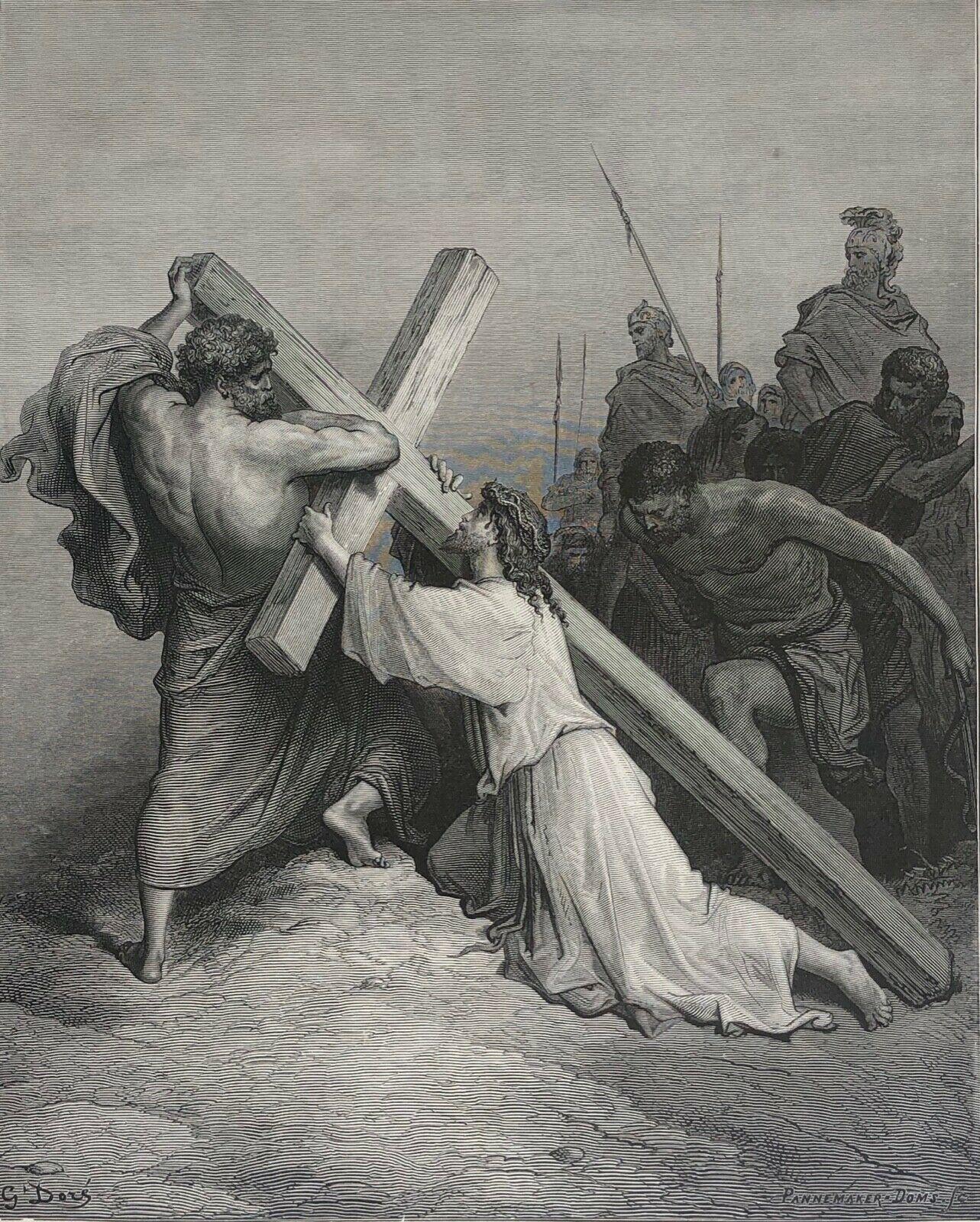MEDULLA S. THOMAE AQUITATIS PER OMNES ANNI LITURGICI DIES DISTRBUITA, SEU MEDITATIONES EX OPERIBUS S. THOMAE DEPROMPTAE
Compilation and arrangement by
FR. Z. MÉZARD O. P.
NOTE
All titles with an asterisk contain material that is no longer attributed to Saint Thomas Aquinas.

28. Tuesday after the IV Sunday of Lent: The Example of Christ Crucified
Tuesday after the IV Sunday of Lent
Our Lord assumed human nature to repair the fall of man. Therefore, it was necessary for Christ to suffer and live according to human nature, as a remedy for the fall into sin.
Now, man’s sin consisted in man clinging to worldly goods and being disinterested in spiritual ones. It was fitting, therefore, for the Son of God, through all that He did and suffered in the human nature He had assumed, to show Himself in such a way that men would regard worldly goods and adversities as nothing, abandon disordered attachment, and devote themselves to spiritual goods.
That is why Christ chose to be born of poor but virtuous parents, to teach us not to glory in the nobility of the flesh or in the wealth of parents.
He lived a poor life to teach the contempt of riches.
He lived without honors to pull men from the disordered greed for them.
He endured labor, thirst, hunger, and bodily torments, so that men, desiring pleasures and delights, would not be led astray from the good of virtue by the miseries of this life.
Finally, it was fitting that the Son of God made man should die, so that, out of fear of death, we would not abandon the path of virtue. And so that we would not fear the ignominious death, He chose the worst of deaths, death on the Cross.
It was also fitting that the Son of God made man should suffer death, so that, by His example, we would be encouraged toward virtue, and so that the words of Saint Peter would be true: "Christ also suffered for us, leaving you an example, that you should follow His steps." (1 Pet 2:21)
Against Armen. Sarac., VII
But Christ also suffered for us, leaving you the example of tribulation, mockery, scourging, the cross, and death, so that we might walk in His footsteps. If we endure tribulations and sufferings for Christ, we will also reign with Him in eternal beatitude. Saint Bernard says: "How few, O Lord, are those who wish to follow you, despite all wanting to be with you and knowing that the beatitudes will be by your side until the end. Now, everyone wants to enjoy you, but few wish to imitate you; they want to reign, but do not want to suffer with you; they do not seek you, but want to find you; they desire to gain, but do not follow."
On the Humanity of Christ, chap. 47
(P. D. Mézard, O.P., Meditationes ex Operibus S. Thomae.)
#God #Deus #Isten #Gott #Jesus #Católico #Catholic #Katholik #katholisch #Katolikus #catholique #Faith #Fé #foi #信仰 #Latin #Latim #Gospel #Evangelho #Evangélium #évangile #Dieu #福音 #日本 #カトリック #Bible #Biblestr #Nostr #Grownostr
quotingTitle of the work in Latin
nevent1q…rvz3
MEDULLA S. THOMAE AQUITATIS PER OMNES ANNI LITURGICI DIES DISTRBUITA, SEU MEDITATIONES EX OPERIBUS S. THOMAE DEPROMPTAE
Compilation and arrangement by
FR. Z. MÉZARD O. P.
NOTE
All titles with an asterisk contain material that is no longer attributed to Saint Thomas Aquinas.

27. Monday after the IV Sunday of Lent: Christ deserved, by His passion, to be exalted
Monday after the IV Sunday of Lent
"He became obedient to the point of death, even death on a cross; therefore God also highly exalted Him." (Phil 2:8)
Merit involves a certain equality with justice. Therefore, the Apostle says that "to the one who works, wages are not reckoned as a gift but as something due" (Rom 4:4). When someone, by his unjust will, claims more for himself than what is owed, it is just that what was owed to him is also diminished, as the book of Exodus says (22): "When a man steals a sheep, he must repay." And we say that he deserved it, for this way his unjust will is punished. Likewise, when someone, by a just will, deprives himself of what he had the right to possess, he deserves to be given more, as a reward for his just will. Therefore, as the Gospel of Luke says, "whoever humbles himself will be exalted" (Luke 14:11).
I. Now, Christ, in His passion, humbled Himself in four ways below His dignity:
a) First, in relation to His passion and death, of which He was not indebted.
b) Second, in relation to the place, for His body was laid in a tomb, and His soul, in the abode of the dead.
c) Third, in relation to the confusion and reproaches He endured.
d) Fourth, in relation to the fact that He was delivered into the hands of men, as He Himself said to Pilate: "You would have no power over me if it had not been given you from above" (John 19:11).
II. By His passion, He deserved exaltation in four ways:
a) First, in relation to the glorious resurrection. Therefore, the psalm says (138:1): "You know my sitting down," that is, the humiliation of my passion, "and my rising up."
b) Second, in relation to the ascension to heaven. Therefore, the Letter to the Ephesians says: "He descended first to the lower parts of the earth. He who descended is also the one who ascended far above all the heavens" (Eph 4:9-10).
c) Third, in relation to the seat He had at the right hand of the Father and the manifestation of His divinity, as Isaiah says: "He shall be exalted and lifted up, and shall be very high; just as many were astonished at you, so His visage was marred more than any man" (52:13-14). And the Letter to the Philippians says (2:8-10): "He became obedient to the point of death, even death on a cross. Therefore, God also has highly exalted Him and given Him the name which is above every name," that is, so that He may be acknowledged as God by all and that everyone should show reverence to Him as to a God. And it is added: "That at the name of Jesus every knee should bow, of those in heaven, and of those on earth, and of those under the earth."
d) Fourth, in relation to the judicial power, for the book of Job says: "Your cause has been judged as that of the wicked. You will receive the judgment and the cause" (Job 36:17).
III, q. XLIX, a. 6
#God #Deus #Isten #Gott #Jesus #Católico #Catholic #Katholik #katholisch #Katolikus #catholique #Faith #Fé #foi #信仰 #Latin #Latim #Gospel #Evangelho #Evangélium #évangile #Dieu #福音 #日本 #カトリック #Bible #Biblestr #Nostr #Grownostr
nevent1q…z4lw
